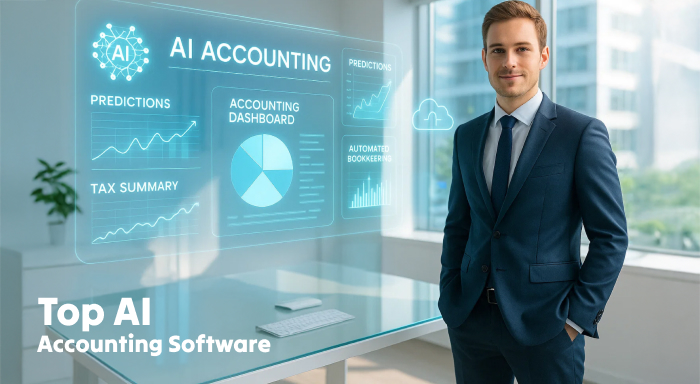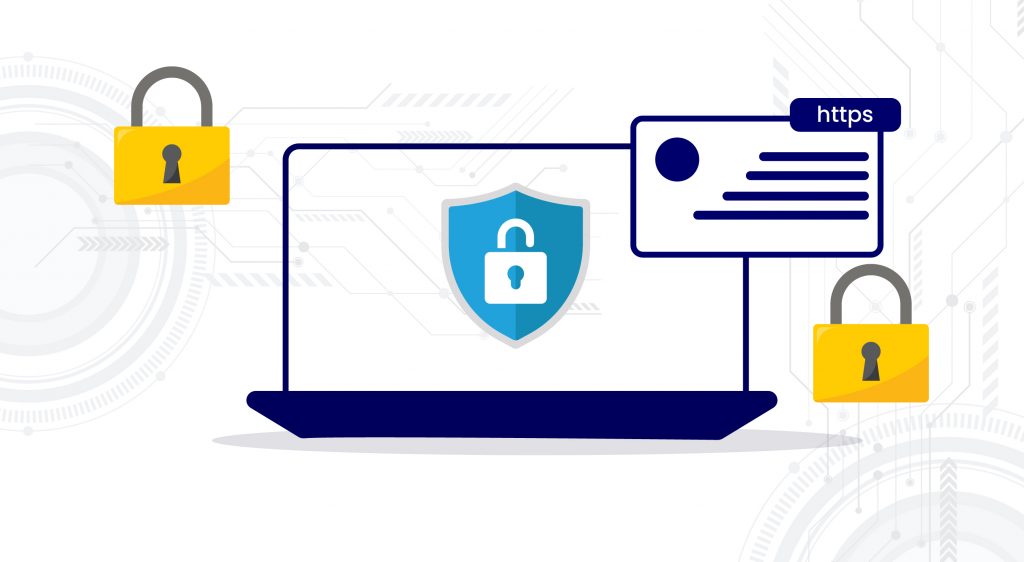The fast-paced world of today requires efficient management of accounts and tax preparation to ensure financial compliances. Traditional processes like data entry and manual bookkeeping are often a time-consuming task which lead to inefficiencies and risk of error. With the rapid technological revolution, artificial intelligence has streamlined this tedious process with simple, effective processes. This streamlined process shortens the time required for tax preparation, provides real-time insights, and prevents potential threats early with predictive analytics. As there are a lot of AI accounting software for taxes available in the marketplace, choosing the right software can make all the difference.
The right accounting software makes tax easier, quicker, and efficient that helps your business stay competitive, innovative, and productive in the agile marketplace. But how do you decide which platform is right for your business process and financial needs? Don’t worry, you are at the right place. This blog will cover a list of top ai accounting software highlighting core features and applications areas. Additionally, this also explains essential features that a good system should have, helping you make informed decisions about choosing the right platform.
What is AI Accounting Software for Taxes?
Before proceeding with the list, it’s crucial to first understand what an AI-powered accounting system truly is. Essentially, these systems are designed to simplify complex accounting processes by eliminating manual and paperwork processes.
Primarily the platform leverages advanced algorithms like machine learning and data analytics to process vast amounts of data, find patterns, and deliver real-time insights. This advancement enables systems to automate invoice generation, approval process, detailed monitoring, and reporting. Predictive analytics help reduce security risks by instant detection of potential threats, allowing professionals to take preventive steps in real time.
AI in accounting software can transform how businesses organize their financial tasks by enabling automation, reducing errors, and eliminating operational costs. Many accounting professionals utilize these AI-driven platforms to streamline their repetitive tasks, save time, and improve interaction.
Essential Features to Consider
- Automated Data Management and Segmentation: The best AI accounting software for taxes can efficiently handle, control, and organize massive volumes of data and offer valuable data insights. These systems should identify patterns and categorize transaction data for more precise tax filing and deduction.
- Real-time Data Analysis: Large organizations often function on massive amounts of data which require advanced capability for analysis and processing. The platform should be capable of performing real-time data analysis to identify data-driven insights, patterns, and anomalies.
- Robust Integration Support: Consider choosing a platform that can seamlessly connect with your existing system, like bank, payment process, and tax filing software. This level of flexibility ensures smooth data flow, precise tax preparation, and improved efficiency.
- Continuous Monitoring and Reporting: Having a clear, comprehensive finance report is crucial for the IRS to verify the taxpay, compliance and regulatory requirement. Always choose software that maintains detailed audit trails, real-time tax evaluation, and report generation tailored to your unique business requirement.
- Fraud Detection: The best AI accounting software for taxes can automatically detect suspicions activities, potential threats, and detect discrepancies. The system instantly generates an alert notification so that the user can take proactive prevention steps, ensuring the safety and integrity of customer data.
- Budgeting and Estimation: Based on past data trends and predictive insights, the right platform can predict future possibilities, identify major challenges, and estimate accurate deductions. In essence, it helps businesses and individuals in financial planning, budget estimations, and quick tips to overcome challenges.
- Tax Preparation: The chosen system needs to have the capability to label transactions, monitor deductions, and generate annual tax filing reports. These systems automatically estimate, prepare, and file tax, eliminating manual processes, save time, and lower risks of errors.
Top 5 Best AI Accounting Software for Taxes
QuickBooks Online (Powered by Intuit AI)
QuickBooks is one of the leading AI accounting software that is renowned for its innovative AI features of layered by Intuit AI. Its smart automation helps businesses monitor income, manage expenses, and tax preparation without manual intervention. The platform offers user-friendly interface, data-driven insights, and personalized financial assistance, making it perfect tool for both novice and professional alike. These metrics help businesses prepare for tax season with categorized transactions, periodic tax budgeting, and deduction report handy in place.
Key Features:
- Intelligent expense tracking and categorizing
- Efficient integration with third party tools like Turbo Tax
- Real-time insights and analysis report generation
- Auto monitoring and deduction capability
Zoho Books
Zoho Books is the widely renowned cloud-based platform in AI tax accounting landscape. One of the essential features is its cost-effectiveness, advanced automation, and robust customizations that make it different from other platforms. The platform offers a wide range of AI tools with robust automation, integration, and management of financial operations. With AI automation feature, user can streamline recurring tasks like invoice generation, tax preparation, and regular reporting.
Key Features:
- AI-driven automation bank transactions, expense tracking, and reconciliation
- Automated audit monitoring, payment reminders, customizable report generations
- Third party integration, especially with Zoho tools, like CRM, inventory, and more
- Real-time team collaboration and dedicated customer support services
Sage Intacct Accounting (Powered by AI Copilot)
Sage Intacct has become a game changer finance management solution driven by AI Copilot and cloud solutions. The main feature is Sage is its smart automation, customization, and anomaly detection capability that make it different from other alternative platforms. Its robust, precise, and effective accounting capabilities, including real-time dashboard, accounting consolidation, and comprehensive reporting make it the best AI accounting software for taxes globally.
Essential Features:
- Balance sheet management with detailed reporting
- Payment reconciliation automation and multi-entity consolidation
- AI-driven dashboard and cash flow analysis for tax preparation
- Invoice generation, real-time monitoring, and account payable
- Robust compliance support for intense tax circumstances
TaxGPT (Powered by ChatGPT)
ChatGPT is the globally best chatbot platform that offers a wide range of tools and features to streamline the repetitive tasks and Tax GPT is one of them. This AI-driven tool is mainly designed for tax professionals and accountants for performing various financial tasks like data analysis, tax preparation, financial reporting. The tool offers fast, accurate, and efficient tasks by attaching resources and entering detailed description of what operation you need to perform.
Core Features:
- Expert features like tax research, preparation, and strategy planning
- Communication assistance to client and stakeholders
- Robust integration capability with existing systems
- Offer high security, accuracy, and compliance support
Docyt AI
Among the one AI accounting software for taxes is Docyt AI featured with robust automation and data analysis capabilities. Meanwhile the platform offers data gathering, real-time financial data insights, and enhanced decision making. With a strong command of expense management, invoice generation, resource management, the platform has become a game-changer for businesses dealing with large transactions. Docyt AI generally collects data from banks, accounting software, and POS systems automatically and performs operations without needing human intervention.
Features to Consider:
- Automatic data collection for financial resources like bank and POSs
- On the go mobile application for receipt and expense tracking
- Analytical reporting based on industry insights for fulfilling tax requirements
- Trained on a vast dataset and can learn from each interaction and past transactions.
Benefits of Leveraging AI Accounting Software for Taxes
Like other technologies, this also entails significant advantages and limitations, knowing both of them makes all the difference.
Pros:
- Automation of repetitive tasks, reconciling accounts, and quick data insights save valuable time.
- Offers advanced precision through minimizing human errors, detecting inconsistencies, and removing duplicate entries.
- Predictive insights and real-time tax evaluation system help estimates liabilities, expenses, and tax bill throughout the year.
- The right platform will adapt and scale with the growth of your business with high precision and speed, even tax policy is changed.
- Many platforms automatically perform tax deduction with thorough evaluation based on current, past, and future trends.
Cons:
- While AI is great at pattern identifications, it can’t replace the expertise of professional finance professionals, especially for complex processes----human insights is required.
- Besides its user friendliness, it may require comprehensive training and experience to lower the chances of errors and inconsistent results.
- As AI accounting software deals with sensitive financial data, this is why selecting a reliable and encrypted platform is non-negotiable.
Conclusion:
As the blog described, the best AI accounting software for taxes helps business handle their financial tasks precisely, efficiently, and in real-time. But choosing the right platform can make all the difference, you need to analyze your financial goals, business needs, and your budget. Look for a tool that can meet your requirements, offer essential features, support strong security practices, and long-term customer service.
The above listed accounting platform can help you in tax deduction monitoring, real-time data insights, automatic reports and invoice generation. Along with this, these platforms help businesses streamline expense, cash flow, tasks management, making tax season efficient and accessible. Instead of juggling between classical methods like spreadsheet and paperwork reporting, try these tools by integrating them with your existing systems. This can enable automation and eliminate manual work, ultimately saving time, increasing efficiency, and eliminating financial risks.



